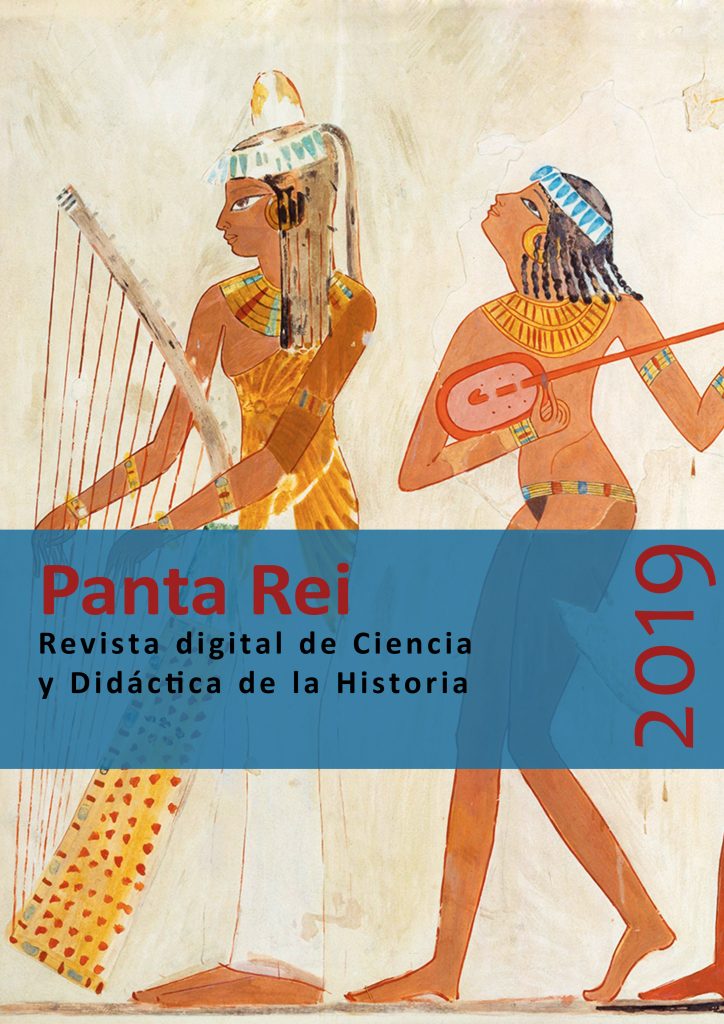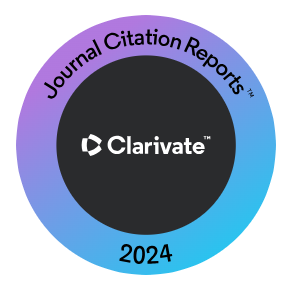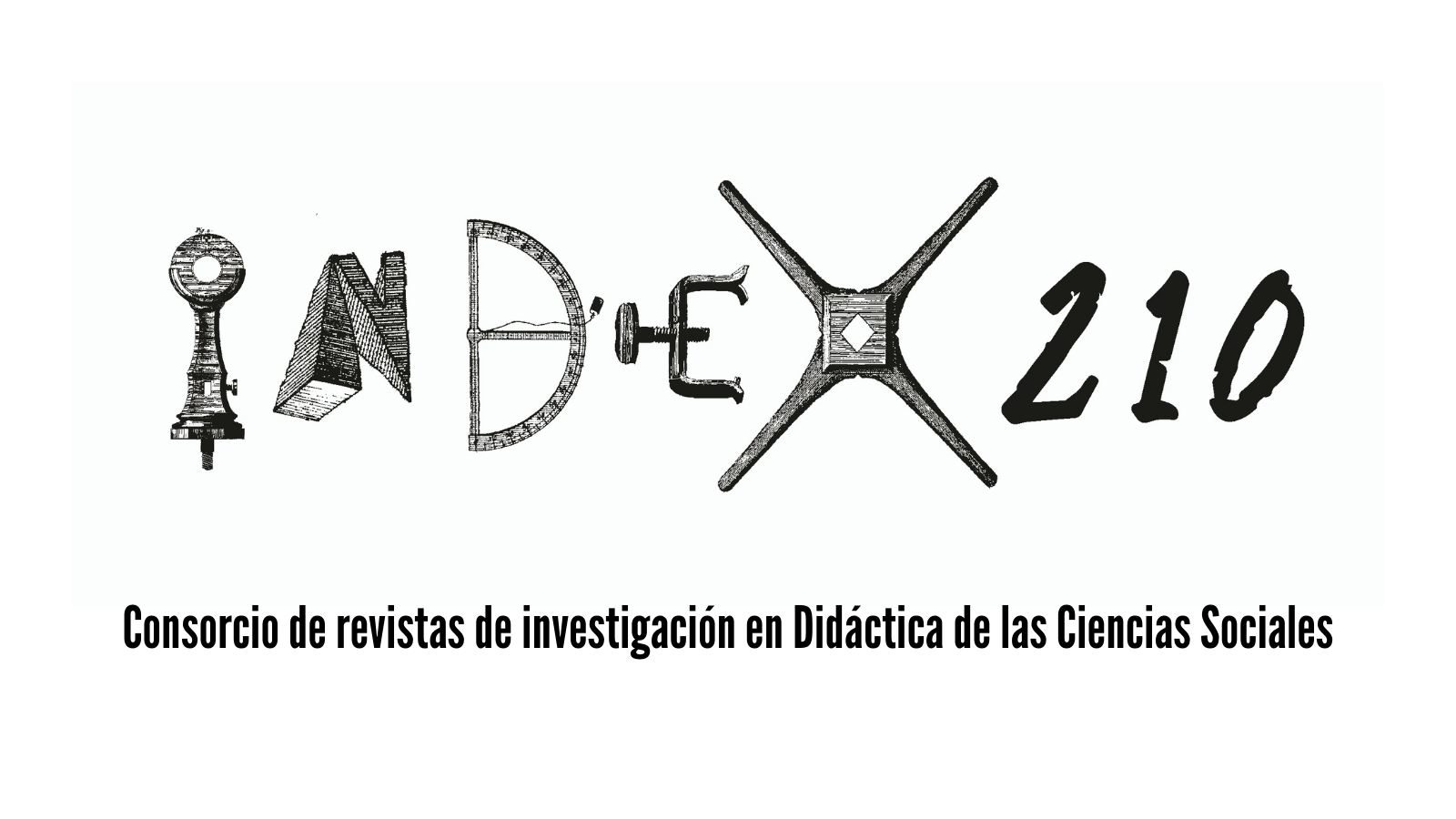Las advertencias de Quilón y Solón sobre la tiranía de Pisístrato
Resumen
La manera en la que conformamos una determinada memoria a partir de hechos trágicos de nuestro pasado repercute en el conocimiento que tenemos de dicho pasado. En el presente artículo se pretende dirimir la veracidad de dos episodios a través de los cuales Quilón de Esparta y Solón de Atenas, dos de los Siete Sabios de la antigua Grecia, avisan de las intenciones de Pisístrato en la consecución de su tiranía. Para ello se analizan ambos casos por separado, atendiendo al contexto de las fuentes y su evolución histórica, a n de entender su plasmación en la historiografía de los siglos V y IV a. C. El análisis historiográ co de estos dos acontecimientos en sus respectivas fuentes nos permite concluir que ambos avisos eran más literarios que históricos.
Descargas
-
Resumen572
-
PDF223
-
EPUB102
Citas
Anderson, G. (2005). Before turannoi were tyrants: rethinking a chapter of early Greek history. Classical Antiquity, 24 (2), 173-222.
Asheri, D., Lloyd, A., Corcella, A. (2007). A Commentary on Herodotus Books I-IV. Oxford: Oxford University Press.
Bernhardt, R. (1987). Die Entstehung der Legende von der tyrannenfeindlichen Außenpolitik Spartas imsechsten und fünften Jahrhundert v. Chr. Historia, 36 (3), 257-289.
Blaise, F. (2006). Poetics and politics: tradition re-worked in Solon’s ‘Eunomia’ (Poem 4). En Blok, J. H. y Lardinois, A. P. M. H. (eds.), Solon of Athens. New historical and philological approaches (pp. 114-133). Leiden-Boston: Brill.
Boedeker, D. (2003). Pedestrian Fatalities: The Prosaics of Death in Herodotus. En Derow, P. y Parker, R. (eds.), Herodotus and his World. Essays from a Conference in Memory of George Forrest (pp. 17-36). Oxford: Oxford University Press.
Crahay, R. (1956). La littérature oraculaire chez Hérodote. Paris: Les Belles Lettres.
Davie, J. H. (1979). Herodotus and Aristophanes on Monarchy. Greece & Rome, 26 (2), 160-168.
Domínguez Monedero, A. J. (1997). El tirano y el juicio de la posteridad. En Presedo, F. J., Guinea, P., Cortés, J. M., y Urías, R. (eds.), Χαῖρε. II Reunión de historiadores del mundo griego antiguo. Homenaje al Profesor Fernando Gascó (pp. 329-346). Sevilla: Sevilla Scriptorium.
Domínguez Monedero, A. J. (2001). Solón de Atenas. Barcelona: Crítica.
Fehling,D.(1985).DiesiebenWeisenunddiefrühgriechischeChronologie.Einetraditionsgeschichtliche
Studie. Bern-Frankurt-New York: Peter Lang.
Fornara, C. W. (1990). Human History and the Constraint of Fate in Herodotus. En Allison, J. W. (ed.), Conflict, antithesis and the Ancient Historian (pp. 25-45). Columbus: Ohio State University Press.
Fornis, C. (2016). Esparta. La historia, el cosmos y la leyenda de los antiguos espartanos. Sevilla: Universidad de Sevilla.
Forsdyke, S. (2008). Herodotus, political history and political thought. En Dewald, C. y Marincola, J. (eds.), The Cambridge Companion to Herodotus (pp. 224-241). Cambridge University Press.
Fowler, R. (2003). Herodotos and Athens. En Derow, P. y Parker, R. (eds.), Herodotus and his World. Essays from a Conference in Memory of George Forrest (pp. 305-317). Oxford: Oxford University Press.
Gilliard, C. (1907). Quelques réformes de Solon. Essai de critique historique. Lausanne: Imprimerie Georges Bridel & Cie.
Gottesmann, A. (2005). Two Notes on Solon Fr. 11W. Mnemosyne, 58 (3), 412-415.
Gouṡchin, V. (1999). Pisistratus ́ Leadership in A. P. 13. 4. and the Establishment of the Tyranny of 561/60 B. C. Classical Quarterly, 49 (1), 14-23.
Gray, V. J. (1996). Herodotus and Images of Tyranny: The Tyrants of Corinth. The American Journal of Philology, 117 (3), 361-389.
Gray, V. J. (1997). Reading the rise of Pisistratus: Herodotus 1.56–68. Histos, 1, 128-153.
Immerwahr, H. R. (1954). Historical action in Herodotus. Transactions and Proceedings of the American Philological Association, 85, 16-45.
Harris, E. M. (2006). Solon and the spirit of the laws in archaic and classical Greece. En Blok, J. H. y Lardinois, A. P. M. H. (eds.), Solon of Athens. New historical and philological approaches (pp. 290-318). Leiden-Boston: Brill.
Lardinois, A. P. M. H. (2006). Have we Solon’s verses? En Blok, J. H. y Lardinois, A. P. M. H. (eds.), Solon of Athens. New historical and philological approaches (pp. 15-35). Leiden-Boston: Brill.
Lateiner, D. (1989). The Historical Method of Herodotus. Toronto-Buffalo-London: University of Toronto Press.
Lavelle, B. M. (1991). The Compleat Angler: Observations on the Rise of Peisistratos in Herodotos (1.59–64). Classical Quarterly, 41 (2), 317-324.
Lavelle, B. M. (1993). The Sorrow and the Pity. A Prolegomenon to a History of Athens under the Peisistratids, c. 560-510 B.C., Historia Einz. 80. Stuttgart: Franz Steiner.
Lavelle, B. M. (2005). Fame, Money and Power. The Rise of Peisistratos and “Democratic” Tyranny at Athens. Ann Arbor: University of Michigan Press.
Luther, A. (2002). Chilon von Sparta. En Goltz, A., Luther, A. y Schlange-Schöningen, H. (eds.), Gelehrte in der Antike. Alexander Demandt zum 65. Geburstag (pp. 1-16). Colonia-Weimar-Wienn: Böhlau.
Masaracchia, A. (1958). Solone. Firenze: La Nuova Italia Editrice.
Masaracchia, A. (1998). Ri essioni sull’antico. Studi sulla cultura greca. Pisa-Roma: Istituti editoriali e poligra ci internazionali.
McGlew, J. F. (1993). Tyranny and political culture in Ancient Greece. Ithaca–London: Cornell University Press.
Miller, M. (1959). The earlier Persian dates in Herodotus. Klio, 37, 29-52.
Mossé, C. (1979). Comment s’élabore un mythe politique: Solon, «père foundateur» de la démocratie athénienne. Annales. Économies, Societés, Civilisations, 34 (3), 425-437.
Mossé, C. (1996). Due miti politici: Licurgo e Solone. En Settis, S. (ed.), I Greci. Storia Cultura Arte Società. 2. Una storia greca. 1. Formazione (pp. 1325-1335). Torino: Einaudi.
Mühl, M. (1956). Solon gegen Peisistratos. Ein Beitrag zur peripatetischen Geschichtschreibung. Rheinisches Museum, 99, 315-323.
Nafissi, M. (1991). La nascita del kosmos. Studi sulla storia e la società di Sparta. Napoli: Edizioni Scientifiche Italiane.
Noussia-Fantuzzi, M. (2010). Solon the Athenian, the Poetic Fragments. Leiden-Boston: Brill.
Paradiso, A. (1995). Tempo della tradizione, tempo dello storcio: Thuc. I. 18 e la storia arcaica spartana. Storia della storiogra a, 28, 35-45.
Rhill, T. E. (1989). Lawgivers and Tyrants (Solon, Frr. 9-11 West). Classical Quarterly, 39 (2), 277-286.
Rhodes, P. J. (2003). Herodotean Chronology Revisited. En Derow, P. y Parker, R. (eds.), Herodotus and his World. Essays from a Conference in Memory of George Forrest (pp. 58-72). Oxford: Oxford University Press.
Richer, N. (1998). Les éphores. Études sur l’histoire et sur l’image de Sparte (VIIIe-IIIe siècles avant J.-C.). Paris: Publications de la Sorbonne.
Rodríguez Adrados, F. (1956). Líricos griegos. Elegíacos y yambógrafos arcaicos (siglos VII - V a.C.). Barcelona: Alma Máter.
Sánchez Mañas, C. (2017). Los oráculos en Heródoto. Tipología, estructura y función narrativa. Zaragoza: Prensas de la Universidad de Zaragoza.
Stehle, E. (2006). Solon’s self-re exive political persona and its audience. En Blok, J. H. y Lardinois, A. P. M. H. (eds.), Solon of Athens. New historical and philological approaches (pp. 79-113). Leiden-Boston: Brill.
Stibbe, C. M. (1985). Chilon of Sparta. Meded, 46, 7-24.
Thommen, L. (1996). Lakedaimonion Politeia: Die Entstehung Der Spartanischen Verfassung, Historia Einz. 103. Stuttgart: Franz Steiner.
Thommen, L. (2017). Sparta. Verfassungs- und Sozialgeschichte einer griechischen Polis. Stuttgart: Metzler.
Vox, O. (1984). Solone autoritratto. Padova: Editrice Antenore.
Waters, K. H. (1971). Herodotos on Tyrants and Despots. A Study in Objectivity. Historia Einz. 15. Wiesbaden: Franz Steiner.
Derechos de autor 2019 Unai Iriarte

Esta obra está bajo una licencia internacional Creative Commons Atribución-CompartirIgual 4.0.
Todos los contenidos publicados en nuestra revista están sujetos a una licencia Atribución 4.0 Internacional (CC BY-SA 4.0) de Creative Commons. Usted es libre de compartir (copiar y redistribuir el material en cualquier medio o formato) y adaptar (remezclar, transformar y crear a partir del material para cualquier finalidad, incluso comercial), bajo los siguientes términos:
Reconocimiento: Debe reconocer adecuadamente la autoría, proporcionar un enlace a la licencia e indicar si se han realizado cambios. Puede hacerlo de cualquier manera razonable, pero no de una manera que sugiera que tiene el apoyo del licenciador o lo recibe por el uso que hace.
CompartirIgual: Si remezcla, transforma o crea a partir del material, deberá difundir sus contribuciones bajo la misma licencia que el original.
El texto completo de la licencia se puede consultar en: Licencia Creative Commons













